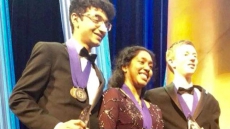Washington will take the lead in getting sanctions imposed on terrorists or look for other ways to take action if faced with Security Council vetoes, according to US Permanent Representative to the UN Nikki Haley.
Haley, who assumed the presidency of the Security Council for April, was asked at a news conference on Monday about terrorist attacks on India and, having said that she "would take names," what would she do about a permanent member's veto on imposing sanctions on certain terrorists.
Describing the US administration as "more aggressive," Haley, who has a cabinet rank in President Donald Trump's government, said that to fight terrorism "the administration is very much looking at all these avenues and some of the things we have talked about is sanctions and who is on the list".

"We want to make sure that we are calling out those that we want to call out. We want to make sure that we are leading towards a result and not sitting back and allowing things to happen," she added.
Haley said: "You are seeing a more aggressive administration because we feel that in order to lead we need to act, and in order to act, we need to make sure we have those conversations."
As permanent member of the Security Council China has used its veto to protect Pakistan-based Jaish-e-Mohammed chief Masood Azhar, who was behind the attack on an air force base in Pathankot, from being included in a list of terrorists who face UN action.

China also provided cover for Pakistan, when it released on bail Zaki-ur-Rehman Lakhvi, the Lakshar-e-Taiban commander who masterminded the 2008 attack on Mumbai which killed more than 160 people. He was already on the UN list of those facing sanctions as terrorists.
Haley did not name China in her remarks. "Are we going to have people who veto certain issues," she asked and answered, "Yes."
"But that doesn't preclude the US from acting and it certainly doesn't preclude us from seeing if we can change that as well," she said.
"So our goal," Haley said, "is to get more done together, then we do separately, and if we cannot get it done separately, then we move in another direction and still get the same things done."


